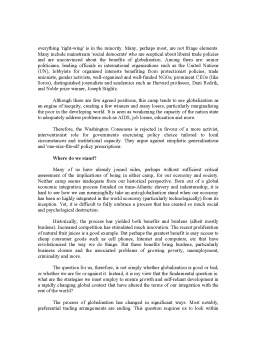Extras din referat
The pro vs. anti-globalisation debate
The term 'globalisation' is a 'catch-all' phrase used to describe the rapid changes taking place in the world economy. But there is much confusion about what it really means. Underlying the din of voices is a simple idea. 'Globalisation' is the process of international economic integration. It is essentially the expansion of production and distribution of goods and services across national boundaries as well as the associated technological, cultural, political and other social changes.
In the past, it was driven by conquest and force. Today, it is driven by WTO rules liberalising market access. At its core, the debate seems to be whether this global integration process is a good or bad thing. Will it lead to growth and prosperity or poverty and marginalisation? Two camps have emerged: Pro-globalisation and Anti-globalisation.
The Pro-globalisation Camp
Pro-globalisation supporters insist that globalisation works! It's good for everyone and it isn't going away. Often referred to as corporate globalisation, the main proponents are large corporations that benefit from the process. They are supported by their governments and mainstream academics (mainly neoclassical economists) that provide theoretical support.
This support relies on the core economic principles rooted in the 19th-century works of Adam Smith and David Ricardo. Revised and elaborated over time, these ideas give powerful support to the view that globalisation, along with a mix of other key policies such as privatisation and deregulation (referred to as the Washington Consensus) are necessary to enhance growth and consumer welfare. It is this theoretical tradition that has shaped the WTO rules and lie at the core of the globalisation debate today.
Supporters rely on evidence, such as the Dollar-Kraay World Bank study (2001), showing that countries that are more open to the world economy grow faster and become richer than those that are closed. The East Asian experience, especially China, is cited as examples of dramatic poverty reduction and high growth in the face of external opening over the past three-and-a-half decades.
Micklethwait & Wooldridge in their book A Future Perfect (2003) concluded: "The simple fact is that globalisation makes us richer -- or makes enough of us richer to make the whole process worthwhile."
The Anti-globalisation Camp
Vehemently opposing this view, the anti-globisation camp comprises factions from widely differing perspectives with no comparable unifying theoretical consensus. The extremist anti-globalisation protestor who also opposes the WTO, capitalism and everything 'right-wing' is in the minority. Many, perhaps most, are not fringe elements. Many include mainstream 'social democrats' who are sceptical about liberal trade policies and are unconvinced about the benefits of globalisation. Among them are: senior politicians, leading officials in international organisations such as the United Nations (UN), lobbyists for organised interests benefiting from protectionist policies, trade unionists, gender activists, well-organised and well-funded NGOs, prominent CEOs (like Soros), distinguished journalists and academics such as Harvard professor, Dani Rodrik, and Noble prize winner, Joseph Stiglitz.
Although there are few agreed positions, this camp tends to see globalization as an engine of inequity, creating a few winners and many losers, particularly marginalising the poor in the developing world. It is seen as weakening the capacity of the nation state to adequately address problems such as AIDS, job losses, education and more.
Therefore, the Washington Consensus is rejected in favour of a more activist, interventionist role for governments exercising policy choice tailored to local circumstances and institutional capacity. They argue against simplistic generalisations and 'one-size-fits-all' policy prescriptions.
Preview document
Conținut arhivă zip
- The Pro vs Anti-Globalisation.doc










